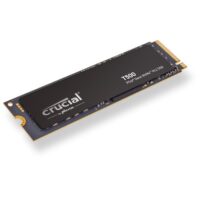CrystalDiskMark
Beim CrystalDiskMark handelt es sich ähnlich wie beim AS SSD Benchmark um ein synthetisches Tool. Für die Tests wird eine 1000 MByte große Datei auf die Festplatte geschrieben bzw. gelesen. Dies erfolgt zum Einen sequentiell, zum Anderen zufallsbasiert mit 512 KByte und 4 KByte großen Datenblöcken. Im 4K-QD32-Test wird mit 32 gleichzeitigen Anfragen gearbeitet.
Anders als der AS SSD Benchmark zeigt CrystalDiskMark jeweils den höchsten Wert aller Durchläufe an.
CrystalDiskMark
Intel Core i5-4670K, ASUS H87-Pro, 8 GB DDR3-1600, GTX 660 Ti, Win 8.1 Pro x64 |
| seq. Lesen
(MB/s) |
| Corsair Force LX 256GB |
| Crucial BX100 500GB |
| Plextor M6 PRO 256GB |
| Toshiba OCZ TR150 480GB |
| Samsung SSD 850 Pro 512GB |
| Samsung SSD 840 Pro 256GB |
| Crucial MX200 512GB |
| Crucial M550 512GB |
| Crucial MX100 512GB |
| Crucial MX300 750GB |
| OCZ ARC 100 240GB |
|
|
| seq. Schreiben
(MB/s) |
| Toshiba OCZ TR150 480GB |
| Crucial MX300 750GB |
| Samsung SSD 850 Pro 512GB |
| Samsung SSD 840 Pro 256GB |
| Crucial M550 512GB |
| Crucial MX200 512GB |
| Plextor M6 PRO 256GB |
| Crucial MX100 512GB |
| Crucial BX100 500GB |
| OCZ ARC 100 240GB |
| Corsair Force LX 256GB |
|
|
512K
Lesen
(MB/s) |
| Crucial M550 512GB |
| Crucial MX100 512GB |
| Samsung SSD 840 Pro 256GB |
| Crucial MX200 512GB |
| Samsung SSD 850 Pro 512GB |
| Toshiba OCZ TR150 480GB |
| Plextor M6 PRO 256GB |
| Corsair Force LX 256GB |
| Crucial BX100 500GB |
| OCZ ARC 100 240GB |
| Crucial MX300 750GB |
|
|
512K
Schreiben
(MB/s) |
| Toshiba OCZ TR150 480GB |
| Crucial MX300 750GB |
| Samsung SSD 850 Pro 512GB |
| Crucial MX200 512GB |
| Crucial M550 512GB |
| Plextor M6 PRO 256GB |
| Samsung SSD 840 Pro 256GB |
| Crucial MX100 512GB |
| Crucial BX100 500GB |
| OCZ ARC 100 240GB |
| Corsair Force LX 256GB |
|
|
4K
Lesen
(MB/s) |
| Samsung SSD 850 Pro 512GB |
| Plextor M6 PRO 256GB |
| Crucial BX100 500GB |
| Toshiba OCZ TR150 480GB |
| Samsung SSD 840 Pro 256GB |
| Crucial MX300 750GB |
| Crucial M550 512GB |
| Crucial MX200 512GB |
| Corsair Force LX 256GB |
| OCZ ARC 100 240GB |
| Crucial MX100 512GB |
|
|
4K
Schreiben
(MB/s) |
| Crucial M550 512GB |
| Crucial MX200 512GB |
| Crucial MX100 512GB |
| OCZ ARC 100 240GB |
| Samsung SSD 850 Pro 512GB |
| Corsair Force LX 256GB |
| Crucial MX300 750GB |
| Samsung SSD 840 Pro 256GB |
| Crucial BX100 500GB |
| Toshiba OCZ TR150 480GB |
| Plextor M6 PRO 256GB |
|
|
4K-QD32
Lesen
(MB/s) |
| Plextor M6 PRO 256GB |
| Samsung SSD 850 Pro 512GB |
| Crucial M550 512GB |
| Samsung SSD 840 Pro 256GB |
| Crucial MX300 750GB |
| Toshiba OCZ TR150 480GB |
| Crucial MX100 512GB |
| OCZ ARC 100 240GB |
| Crucial MX200 512GB |
| Corsair Force LX 256GB |
| Crucial BX100 500GB |
|
|
4K-QD32
Schreiben
(MB/s) |
| Samsung SSD 850 Pro 512GB |
| Samsung SSD 840 Pro 256GB |
| Crucial M550 512GB |
| Crucial MX200 512GB |
| OCZ ARC 100 240GB |
| Crucial MX100 512GB |
| Plextor M6 PRO 256GB |
| Toshiba OCZ TR150 480GB |
| Crucial MX300 750GB |
| Crucial BX100 500GB |
| Corsair Force LX 256GB |
|
|
Alles in allem betrachtet werden die Ergebnisse aus dem AS SSD Benchmark durch die Resultate im CrystalDiskMark bestätigt.
Beim Lesen schneidet die MX300 sehr schwach ab. Das Schreiben erledigt die MX300 aufgrund des Pseudo-SLC-Caches sehr schnell. Im 4K-Bereich hält sich die SSD im Mittelfeld.



Neueste Kommentare
8. Januar 2026
8. Januar 2026
8. Januar 2026
8. Januar 2026
8. Januar 2026
8. Januar 2026